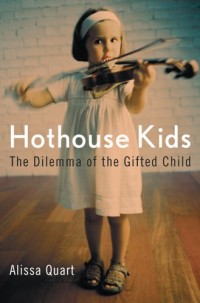 A few years ago, inquiring journalists began writing about the deception behind Baby Einstein videos, which promised to make toddlers smarter. Not only were the videos of no educational value, they could be harmful; the American Academy of Pediatrics advises that children under the age of two should not watch videos. My wife, Alissa Quart, was one of the skeptics. She wrote about the problem in her 2006 book, Hothouse Kids, and her chapter on the Baby Einstein phenomenon was excerpted in today’s New York Times summed up the situation:
A few years ago, inquiring journalists began writing about the deception behind Baby Einstein videos, which promised to make toddlers smarter. Not only were the videos of no educational value, they could be harmful; the American Academy of Pediatrics advises that children under the age of two should not watch videos. My wife, Alissa Quart, was one of the skeptics. She wrote about the problem in her 2006 book, Hothouse Kids, and her chapter on the Baby Einstein phenomenon was excerpted in today’s New York Times summed up the situation:
Last year, lawyers threatened a class-action lawsuit for unfair and deceptive practices unless Disney agreed to refund the full purchase price to all who bought the videos since 2004. “The Walt Disney Company’s entire Baby Einstein marketing regime is based on express and implied claims that their videos are educational and beneficial for early childhood development,” a letter from the lawyers said, calling those claims “false because research shows that television viewing is potentially harmful for very young children.” The letter cited estimates from The Washington Post and Business Week that Baby Einstein controlled 90 percent of the baby media market, and sold $200 million worth of products annually. The letter also described studies showing that television exposure at ages 1 through 3 is associated with attention problems at age 7.
It’s a children’s story with a happy ending.

